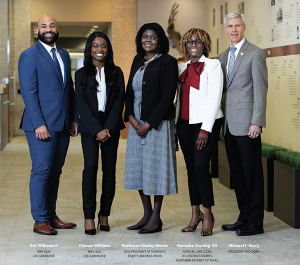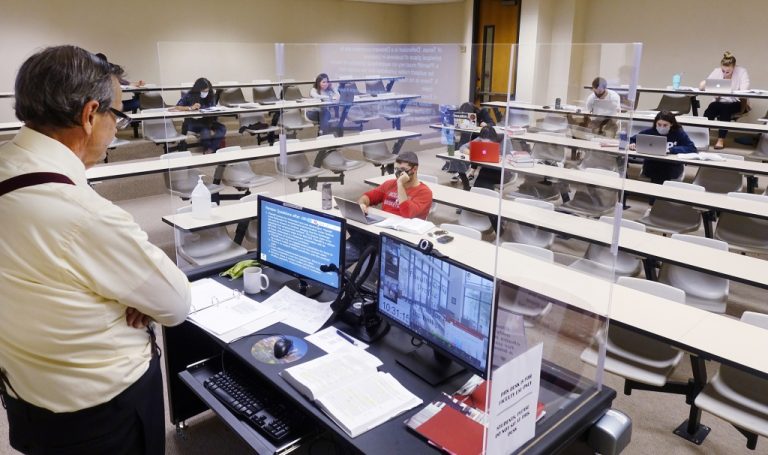 South Texas College of Law alumna Kenesha Starling ’20 served as the first Black editor in chief of the South Texas Law Review in 2019-20. Eric Williams II, a May 2022 J.D. candidate, is the current editor in chief of the Law Review. Encouraged by Dean Barry and Vice President Moore, Chanae Williams, a May 2022 J.D. candidate and articles editor for the South Texas Law Review, captured a candid discussion with Starling and Williams that explores diversity, equity and inclusion within the legal profession.
South Texas College of Law alumna Kenesha Starling ’20 served as the first Black editor in chief of the South Texas Law Review in 2019-20. Eric Williams II, a May 2022 J.D. candidate, is the current editor in chief of the Law Review. Encouraged by Dean Barry and Vice President Moore, Chanae Williams, a May 2022 J.D. candidate and articles editor for the South Texas Law Review, captured a candid discussion with Starling and Williams that explores diversity, equity and inclusion within the legal profession.
CW: What are some misconceptions about Black law students and attorneys that need to be dispelled?
EW: The first misconception is that articulate and intelligent Black and Brown law students are some sort of anomaly. I can speak to this from personal experience during my on-campus interviews with a particular firm. I went through the entire interview process with the associates and senior counsel, and I was finally interviewing with the managing partner. I gave my “elevator pitch” as we are taught to give, and the first words out of his mouth were not “Thank you for that!” or “Let me tell you a little about myself.” The first thing he said was, “Wow, you are so incredibly articulate!” It was like he was … shocked.
Why wouldn’t I be articulate? What would make him think that I would be something other than that? Black legal professionals are just as qualified as our counterparts and will completely “wow” you in large part because of the unique perspectives and experiences we carry with us.
The second thing is that I am not the sole representative for the Black community. Although I am a Black man, the Black community consists of a diverse array of backgrounds, expectations and political views. So, the best thing to do is not to make generalities or to make assumptions. Instead, approach each person as a unique individual because that’s what they are.
KS: I agree. Black and Brown law students and attorneys are expected to learn to navigate an environment led by and full of people who don’t look like us. I would implore the legal community to exert the same effort for us. We don’t all come from the same walks of life, and we don’t all have the same experiences. It shouldn’t be assumed that someone is a “diamond in the rough” because they speak, dress or walk … what, better than you expected? You have to consider people and their unique experiences. There has to be a little bit of introspection to make certain that people are not jumping to conclusions.
Also, I take issue with the too-common usage of adjectives like “aggressive,” “angry” or “defensive” to describe Black attorneys and law students. Speaking louder than you does not make me aggressive. Explaining something after you asked me a question does not make me defensive. The situation shouldn’t be described differently because I’m Black and you’re not.
Speaking of unequal standards, from a young age Black people are told that another’s “A” is equal to our “A+.” We have to shine brighter to get equal, or oftentimes less, recognition. Therefore, we strive for unattainable levels of perfection, creating expectations of ourselves that are impossible to maintain. Our high-performance work ethic can cause high rates of burnout because everyone else expects a lot from us as well.
Finally, I would also say that there is no need to stop a conversation about race when a Black person walks in the room. I may have a perspective on that conversation, but maybe I don’t; it depends on my personal experience.
It’s very uncomfortable to be in a room having a professional legal conversation and then have somebody say, “Oh, we’re not going to discuss the ‘race thing.’ ” If the case was about Black people, we can’t just gloss over the ‘race thing.’ Don’t be afraid to talk about race. Just be respectful and include diverse perspectives in the conversation.
CW: What impact does your presence have in law firms, law schools, courtrooms and all other legal spaces?
KS: When Vice President Kamala Harris was elected and so many little Black and Brown girls around the country said, “That could be me” — it’s like that. Because when you get in-person interview opportunities, when you’re in a courtroom as the law clerk, when you’re the intern in the appellate court, or when you’re the associate at a big firm and other Black students see that — it opens a whole new world of possibilities for the future.
Sometimes being in those spaces is hard. But don’t be afraid to be the only Black attorney at your law firm or in your practice area because it won’t be too long before others follow the pathway you created and join you.
It’s important because it means the seats at the table are not taken by people who all look the same. It becomes a more diverse and true representation of our population. With more diverse perspectives shaping our legislature, the law will work better for everyone.
EW: Yes, I think the impact is further reaching than Kenesha or I can see now. Progress ripples out from these singular instances and moments — like Kenesha being the first Black editor in chief of the South Texas Law Review, and now I’m the first Black male editor in chief and the only Black judicial intern at the federal courthouse.
When you walk in those places where, traditionally, Black people have not been, there is a sense of pride, like I am representing something bigger — showing what’s possible for other Black law students. It makes me want to continue to do these things so other people have even better opportunities. What Kenesha has done for me has been extremely impactful, and I hope to do the same for others.
The more Black and Brown people we have at the table creating laws, becoming prosecutors, and facilitating billion- dollar M&A deals, the better the legal profession and our society in general will be. Houston is the most diverse city in the country, so there should be no reason why the legal profession should not reflect that diversity as well.
KS: We, as a legal community, have to change the narrative and eliminate any hesitation about the positive impact of having Black attorneys at a firm. When a firm or company hires one Black attorney — and somebody has to be willing to be that one — that business or firm tends to be more open to hiring more Black attorneys. Just in the last few years, I have seen firms starting to make this change. It gives me a lot of hope for the future of the Houston legal community.
For more on Black History Month, check out visit https://www.stcl.edu/about-us/black-history-month/



